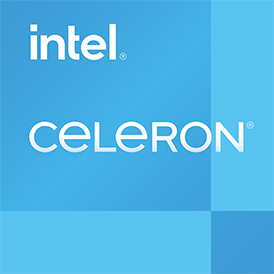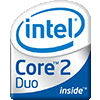
Intel Celeron G1610 Benchmark, Test and specs
Last updated:
The Intel Celeron G1610 is a 2 core processor. It can handle 2 threads simultaneously and was introduced in Q1/2013. The Intel Celeron G1610 is based on the 3. generation of the Intel Celeron series and requires a mainboard with the socket LGA 1155. The Intel Celeron G1610 scores 515 points with one CPU core in the Geekbench 5 benchmark. When using all CPU cores, the result is 1,029 points.

| Name: | Intel Celeron G1610 |
|---|---|
| Family: | Intel Celeron (165) |
| CPU group: | Intel Celeron G1000 (12) |
| Architecture: | Ivy Bridge S |
| Segment: | Desktop / Server |
| Generation: | 3 |
| Predecessor: | -- |
| Successor: | -- |
CPU Cores and Base Frequency
The 2 CPU cores of the Intel Celeron G1610 clock with 2.60 GHz. The number of CPU cores and the clock frequency of the processor are largely responsible for the overall performance.
| CPU Cores / Threads: | 2 / 2 |
|---|---|
| Core architecture: | normal |
| Cores: | 2x |
| Hyperthreading / SMT: | No |
|---|---|
| Overclocking: | No |
| Frequency: | 2.60 GHz |
| Turbo Frequency (1 Core): | -- |
| Turbo Frequency (2 Cores): | -- |
Internal Graphics
With the Intel HD Graphics (Ivy Bridge GT1), the Intel Celeron G1610 has an build in graphic solution. It has 6 SM processors, which have a total of 48 texture shaders. The iGPU not only enables games, but also significantly accelerates video playback.
| GPU name: | Intel HD Graphics (Ivy Bridge GT1) |
|---|---|
| GPU frequency: | 0.65 GHz |
| GPU (Turbo): | 1.05 GHz |
| Compute units: | 6 |
| Shader: | 48 |
| Hardware Raytracing: | No |
| Release date: | Q4/2012 |
| Max. displays: | 3 |
|---|---|
| Generation: | 7 |
| Direct X: | 11.0 |
| Technology: | 22 nm |
| Max. GPU Memory: | 2 GB |
| Frame Generation: | No |
Hardware codec support
Processors that have an integrated graphics can play videos faster and more efficiently. This can have a positive effect on the battery life of notebooks, for example.
| h265 / HEVC (8 bit): | No |
|---|---|
| h265 / HEVC (10 bit): | No |
| h264: | Decode / Encode |
| VP8: | No |
| VP9: | No |
| AV1: | No |
|---|---|
| AVC: | Decode / Encode |
| VC-1: | Decode |
| JPEG: | Decode |
Memory & PCIeThe Intel Celeron G1610 supports up to 32 GB memory in up to 2 (Dual Channel) memory channels. This results in a maximum memory bandwidth of 21.3 GB/s. |
|
| Memory type: | Memory bandwidth: |
|---|---|
| DDR3-1333 | 21.3 GB/s |
| Max. Memory: | 32 GB |
| Memory channels: | 2 (Dual Channel) |
| ECC: | Yes |
| PCIe: | 2.0 x 16 |
| PCIe Bandwidth: | 8.0 GB/s |
Thermal ManagementWith the TDP, the processor manufacturer specifies the cooling solution required for the processor. The Intel Celeron G1610 has a TDP of 55 W. |
|
|---|---|
| TDP (PL1 / PBP): | 55 W |
| TDP (PL2): | -- |
| TDP up: | -- |
| TDP down: | -- |
| Tjunction max.: | -- |
Technical details
The Intel Celeron G1610 has a 2.00 MB large cache. The processor is manufactured in 22 nm. Modern production increases the efficiency of the processor.
| Technology: | 22 nm |
|---|---|
| Chip design: | Monolithic |
| Socket: | LGA 1155 |
| L2-Cache: | -- |
| L3-Cache: | 2.00 MB |
| AES-NI: | Yes |
| Operating systems: | Windows 10, Linux |
| Virtualization: | VT-x, VT-x EPT, VT-d |
|---|---|
| Instruction set (ISA): | x86-64 (64 bit) |
| ISA extensions: | SSE4.1, SSE4.2 |
| Release date: | Q1/2013 |
| Release price: | 42 $ |
| Part Number: | -- |
| Documents: | Technical data sheet |
Rate this processor
Benchmark results

The benchmark results for the Intel Celeron G1610 have been carefully checked by us. We only publish benchmark results that have been created by us or that have been submitted by a visitor and then checked by a team member. All results are based on and fullfill our benchmark guidelines.
Geekbench 5, 64bit (Single-Core)
Geekbench 5 is a cross plattform benchmark that heavily uses the systems memory. A fast memory will push the result a lot. The single-core test only uses one CPU core, the amount of cores or hyperthreading ability doesn't count.

|
AMD FX-4170
4C 4T @ 4.40 GHz |
||

|
AMD FX-8300
8C 8T @ 4.20 GHz |
||

|
Intel Core i3-6102E
2C 4T @ 1.90 GHz |
||
|
|
Intel Celeron G1610
2C 2T @ 2.60 GHz |
||

|
Intel Core i3-2120T
2C 4T @ 2.60 GHz |
||

|
Intel Celeron 3955U
2C 2T @ 2.00 GHz |
||

|
Intel Core i7-920
4C 8T @ 2.93 GHz |
||
Geekbench 5, 64bit (Multi-Core)
Geekbench 5 is a cross plattform benchmark that heavily uses the systems memory. A fast memory will push the result a lot. The multi-core test involves all CPU cores and taks a big advantage of hyperthreading.

|
Intel Core i3-4030U
2C 4T @ 1.90 GHz |
||

|
Intel Core i5-2557M
2C 4T @ 1.70 GHz |
||

|
Samsung Exynos 7885
8C 8T @ 2.20 GHz |
||
|
|
Intel Celeron G1610
2C 2T @ 2.60 GHz |
||

|
Samsung Exynos 850
8C 8T @ 2.00 GHz |
||

|
Qualcomm Snapdragon 653
8C 8T @ 1.95 GHz |
||

|
Intel Pentium G2010
2C 2T @ 2.80 GHz |
||
iGPU - FP32 Performance (Single-precision GFLOPS)
The theoretical computing performance of the internal graphics unit of the processor with simple accuracy (32 bit) in GFLOPS. GFLOPS indicates how many billion floating point operations the iGPU can perform per second.

|
Intel Celeron G1620
Intel HD Graphics (Ivy Bridge GT1) @ 1.05 GHz |
||

|
Intel Pentium G2010
Intel HD Graphics (Ivy Bridge GT1) @ 1.05 GHz |
||

|
Intel Pentium G2020
Intel HD Graphics (Ivy Bridge GT1) @ 1.05 GHz |
||
|
|
Intel Celeron G1610
Intel HD Graphics (Ivy Bridge GT1) @ 1.05 GHz |
||

|
MediaTek Helio P70
ARM Mali-G72 MP3 @ 0.90 GHz |
||

|
UNISOC T616
ARM Mali-G57 MP1 @ 0.75 GHz |
||

|
Intel Pentium 2117U
Intel HD Graphics (Ivy Bridge GT1) @ 1.00 GHz |
||
Estimated results for PassMark CPU Mark
Some of the CPUs listed below have been benchmarked by CPU-monkey. However the majority of CPUs have not been tested and the results have been estimated by a CPU-monkey’s secret proprietary formula. As such they do not accurately reflect the actual Passmark CPU mark values and are not endorsed by PassMark Software Pty Ltd.

|
Samsung Exynos 7884
8C 8T @ 1.60 GHz |
||

|
Intel Core i3-540
2C 4T @ 3.06 GHz |
||

|
Intel Celeron G1620T
2C 2T @ 2.40 GHz |
||
|
|
Intel Celeron G1610
2C 2T @ 2.60 GHz |
||

|
MediaTek Helio X25
10C 10T @ 2.50 GHz |
||

|
AMD Athlon II X2 370K
2C 2T @ 4.20 GHz |
||

|
Intel Core i3-2120T
2C 4T @ 2.60 GHz |
||
CPU-Z Benchmark 17 (Multi-Core)
The CPU-Z benchmark measures a processor's performance by measuring the time it takes the system to complete all benchmark calculations. The faster the benchmark is completed, the higher the score.

|
Intel Core i3-2330M
2C 4T @ 2.20 GHz |
||

|
Intel Core i3-4030U
2C 4T @ 1.90 GHz |
||

|
Intel Pentium E6700
2C 2T @ 3.20 GHz |
||
|
|
Intel Celeron G1610
2C 2T @ 2.60 GHz |
||

|
Intel Core2 Duo E7600
2C 2T @ 3.06 GHz |
||

|
AMD A10-9600P
4C 4T @ 2.40 GHz |
||

|
Intel Pentium E6600
2C 2T @ 3.06 GHz |
||
Cinebench R15 (Single-Core)
Cinebench R15 is the successor of Cinebench 11.5 and is also based on the Cinema 4 Suite. Cinema 4 is a worldwide used software to create 3D forms. The single-core test only uses one CPU core, the amount of cores or hyperthreading ability doesn't count.

|
AMD Athlon X4 845
4C 4T @ 3.80 GHz |
||

|
AMD Phenom II X6 1100T
6C 6T @ 3.70 GHz |
||

|
Intel Core m3-8100Y
2C 4T @ 3.40 GHz |
||
|
|
Intel Celeron G1610
2C 2T @ 2.60 GHz |
||

|
AMD A10-9700
4C 4T @ 3.80 GHz |
||

|
Intel Core m3-6Y30
2C 4T @ 2.20 GHz |
||

|
Intel Core i5-4210U
2C 4T @ 2.70 GHz |
||
Cinebench R15 (Multi-Core)
Cinebench R15 is the successor of Cinebench 11.5 and is also based on the Cinema 4 Suite. Cinema 4 is a worldwide used software to create 3D forms. The multi-core test involves all CPU cores and taks a big advantage of hyperthreading.

|
AMD Phenom II X2 521
2C 2T @ 3.50 GHz |
||

|
Intel Core m3-8100Y
2C 4T @ 1.10 GHz |
||

|
Intel Core i3-3227U
2C 4T @ 1.90 GHz |
||
|
|
Intel Celeron G1610
2C 2T @ 2.60 GHz |
||

|
Intel Celeron 2970M
2C 2T @ 2.20 GHz |
||

|
AMD Phenom II X2 B59
2C 2T @ 3.40 GHz |
||

|
AMD Phenom II X2 565
2C 2T @ 3.40 GHz |
||
Benchmarks

Geekbench 5 (SC)
2,488 entries
2,488 entries

Geekbench 5 (MC)
2,461 entries
2,461 entries

FP32 SP (iGPU)
2,042 entries
2,042 entries

PassMark CPU-Mark
2,392 entries
2,392 entries

CPU-Z Benchmark 17 (MC)
733 entries
733 entries

Cinebench R15 (SC)
1,106 entries
1,106 entries

Cinebench R15 (MC)
1,101 entries
1,101 entries

Geekbench 3 (SC)
942 entries
942 entries

Geekbench 3 (MC)
938 entries
938 entries

Cinebench R11.5 (SC)
825 entries
825 entries

Cinebench R11.5 (MC)
836 entries
836 entries

Cinebench R11.5 iGPU
383 entries
383 entries
Popular comparisons
back to index





